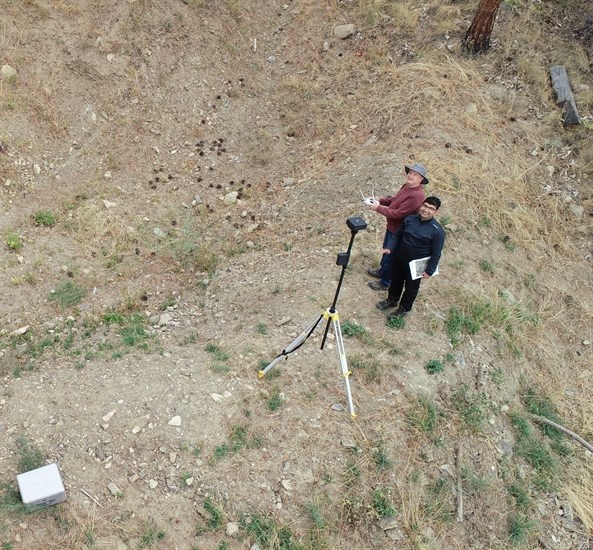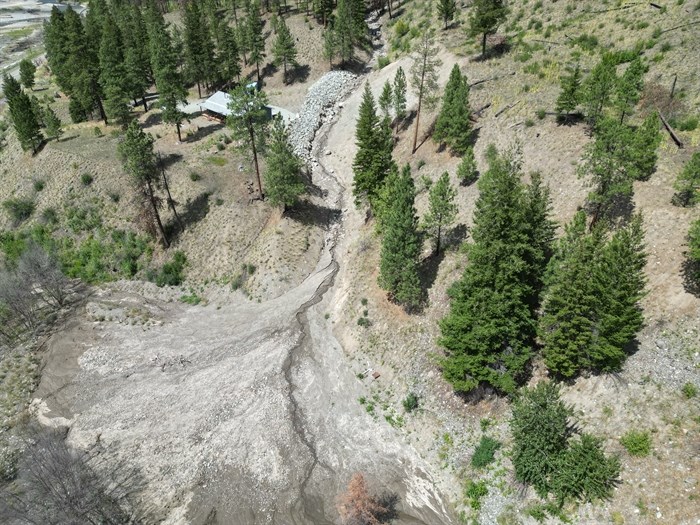
Kaushal Gnyawali and supervisor Dr. Dwayne Tannant doing field work
Image Credit: SUBMITTED/Kaushal Gnyawali
November 18, 2023 - 3:30 PM
Through its Public Scholars Initiative, the University of British Columbia Okanagan is making wildfire regions, such as the Okanagan, safer.
Kaushal Gnyawali is a public scholar whose research will protect communities in the wake of wildfires.
“When a region is affected by a wildfire, the earth of that region becomes so firm that it becomes nearly impossible for it to absorb any water. This makes it very susceptible to floods,” Gnyawali says. “After a wildfire, even the slightest amount of rain will cause a significant amount of debris flow down some watersheds. These debris flows will impact not only people, but also infrastructure.”
Gnyawali developed an interest in studying small-scale watersheds in BC to study the post-wildfire debris flows to better predict their pathways and protect communities, he points out that the Okanagan is a prime region to study this as it is severely affected.
His interest in the research also comes from observing how climate change is impacting these events.
“There’s going to be a lot of debris flows after wildfires impact an area like the Okanagan, and those debris flows impact that area for a very long time, could be up to a decade or more, wildfire becomes a double hazard," he said. "So some mitigation has to be applied at the outlet of these watersheds or channels from which the debris comes out. That is where my research comes in.
"I am coming up with a method to build and design very small-scale, low-cost and efficient structures called deflection berms that would be of a certain height above expected flood level and thick enough to withhold debris from impacting.
"As the climate is changing, the intensity of wildfires and rain is getting worse as well as their rate of occurrence and the infrastructure will not be capable of handling the high volume of debris falling and making impact. With climate change, the debris is also becoming bigger and more damaging this is why we need the deflection berms.”

Drone footage of debris flow damage
Image Credit: SUBMITTED/Kaushal Gnyawali
The goals of this research are multiple, but ultimately the research serves to protect communities affected by this issue.
“In the long run, understanding these events, especially in terms of how big and fast they can be in the Okanagan region, will create a new understanding of these events. Once we understand this, we can start to understand what kind of deflection berms we need to build to protect communities from watersheds," he said. "We can then put in place easy guidelines if the watershed is predicted to be this big, then the deflection berm should be this big, and this way we can protect many communities especially those that are new to these events.”
To achieve these goals, Gnyawali is working with many Indigenous communities to get valuable information.
In turn, the Indigenous communities will benefit from their collaboration. They are disproportionately at risk of post-wildfire debris flows compared to non-Indigenous communities.
“For my research, the Indigenous communities have been so helpful by letting me on their land to map the events and I am so grateful for their collaboration. I have worked with the Okanagan Indian Band, the Nooaitch Indian Band, and the Nicomen Indian Band,” Gnyawali says. “They know their watersheds so much better than we do so they have instrumental information to the research, and understanding the events from the people who live it is so valuable and it will help me predict future events which will allow for better prevention.”
Gnyawali is in his third year of research at the UBCO in the Public Scholars Initiative. He's one of seven Public Scholars at the university. To discover more about him, his research and the other scholars, visit the university’s website here.
To contact a reporter for this story, email Gabrielle Adams or call (250) 863-7592 or email the editor. You can also submit photos, videos or news tips to the newsroom and be entered to win a monthly prize draw.
We welcome your comments and opinions on our stories but play nice. We won't censor or delete comments unless they contain off-topic statements or links, unnecessary vulgarity, false facts, spam or obviously fake profiles. If you have any concerns about what you see in comments, email the editor in the link above. SUBSCRIBE to our awesome newsletter here.
News from © iNFOnews, 2023